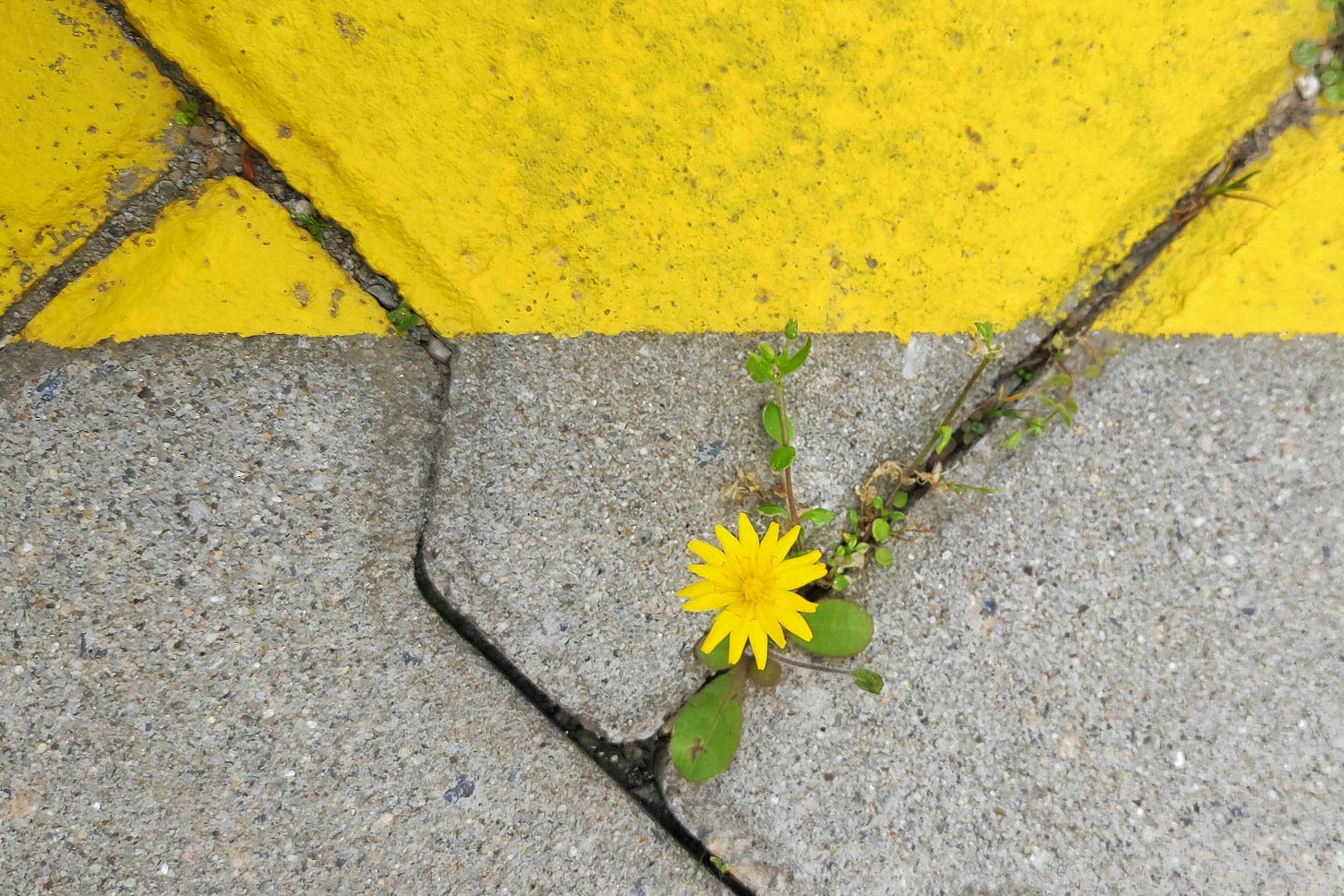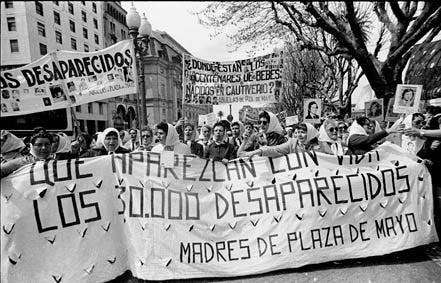We Are Seeds: What Latin American Resistance Movements Can Teach Us Now
"They Tried to Bury Us, They Didn't Know We Were Seeds." ~ Inspired by Nicaraguan poet Ernesto Cárdenas

It’s been just over two weeks after the election, and what can I tell ya? Watching the country slowly brace itself for what might very well be “our worst timeline”— to reference the iconic TV series Community — has been quite the exercise. These two weeks have taught me loads about human nature, grieving, and resiliency.
Online, discussions fall between the implied “it’s a done deal” assertions from mainstream media and the left’s realist faction, and the newly-dubbed “blue-anon” conspiracy theories. Yet somewhere in the middle, I suspect, is a vast group of everyday Americans coping with the foretold death of democracy as best as they can.
To be clear, my suspicions stem from purely anecdotal evidence: My discord groups have gone silent. Some friends and family now take days before answering texts. Even my “joyous warriors” action group has splintered, each member retreating in their own way. Some of my friends just can’t bear to look at the news anymore. Some stopped posting online. Some are just burning hot with fury —"We did everything right, and for what?" Still others, ever steady and unshakeable, have simply shrugged: "Maybe it’s time to accept reality."
Mind you, this is not an attempt to call them out. These are good people. Passionate people. People who fight hard and love deeply. People who care enough about this country to put their time, efforts and even reputations on the line for it. Watching them retreat into a slow tide of despair, I must confess, initially took me a bit aback. See, I’ve already reached my 'fight back' era.
However, as I have mentioned before, we all process things at our own pace. We all deserve some grace. So here’s what I’d say to my friends who've stepped back: Your exhaustion is valid. Your anger is justified. Your grief is real. But you are not finished. You see, the last thing we can afford to do at this point is to confuse a single defeat with the end of the whole journey. We are not done. We are not defeated. We are seeds, waiting to break through.
“Creyeron que te enterraban / Y lo que hacían era enterrar una semilla.
"They thought they buried you / but what they did was bury a seed."
When Nicaraguan poet Ernesto Cárdenas wrote those beautiful words in the 1950s, he couldn't have imagined that his friend Adolfo Báez Bone's epitaph would turn into a global cry for justice. But his verse found new life in 2014, as Mexico erupted in protests over the disappearance of 43 students from the Ayotzinapa Rural Teachers' College. Since then, it has been adopted by activist groups fighting for justice and equality everywhere: "They tried to bury us, they didn't know we were seeds."
There’s a reason for the phrase’s ongoing popularity: it captures a truth that resonates in every struggle against oppression — something that my discouraged friends may have forgotten. This isn't about one election. This isn’t about this moment in time. This is about understanding that every setback is like soil—rich, complex, containing everything necessary for the next growth.
Think of a seed. It gets buried in the dark, pressed down by weight, surrounded by ground that seems intent on crushing it. Nevertheless, as Elizabeth Warren would say, it persists. A seed doesn't know how to give up. It doesn’t surrender. It understands something profound: that darkness is not the end. It's the beginning of transformation.

Lessons from the Latin American Resistance
Another thing a seed doesn’t do? Grow alone. A seed grows in gardens, in forests, in vast networks of mutual support and nurturing. And there’s plenty of historical evidence to show us what they can do when they grow together. Across Latin America, for example, grassroot movements have faced down some of the darkest forms of corruption in government — and won:
In the aforementioned ongoing case of the Ayotzinapa Mexican students, their families have found the fortitude to overcome their unbearable pain, to stand up and organize. Through their efforts so far, they’ve been able to force open government files, secure arrests of high-ranking officials, and expose the web of corruption that enabled the students’ disappearances. While their fight for full justice continues, they've shown the world that no power can silence a movement rooted in love and righteous anger.
Further south, in Argentina, the ‘Madres de la Plaza de Mayo’ (Mothers of the Plaza de Mayo) turned their grief into unstoppable power, marching every Thursday for decades, demanding justice for their disappeared children. They wore white headscarves, turning the symbols of traditional motherhood into badges of revolution. They’ve never stopped. Today, their persistence has helped bring hundreds of torturers and murderers to justice.
In Chile, when Pinochet attempted to suppress artists during his dictatorship, they responded with murals that transformed entire city walls into pleas for justice. Musicians produced new types of protest songs based on metaphor and poetry to avoid censorship. Artisan women formed cooperatives, transforming their colorful burlap pictures (arpilleras) into tapestries that told stories of resistance. Every drop of paint, every note, every stitch represented an act of rebellion.
In Brazil, the Movimento dos Trabalhadores Rurais Sem Terra (landless workers' movement) has occupied and recovered abandoned rural land and transformed it into productive communities. They haven’t just opposed large landed estates. They’ve created something new, advocating for schools, healthcare and equal rights for rural workers. To this day, they’ve adopted their slogan as a strategy: "Occupy. Resist. Produce."
In the Dominican Republic, the Mirabal sisters—Patria, Minerva, and María Teresa — dared to resist Rafael Trujillo's brutal regime, even as they knew it could cost them their lives. Which it ultimately did. The silver lining? Though they were murdered in 1960, their assassination triggered a worldwide movement which eventually led to Trujillo's downfall. Their brother, mother and sister continued to fight, keeping their memories alive. As their story proves, it may be possible to take someone’s life, but ideals live on forever.

To me, these movements teach us a crucial lesson: resistance isn't just about saying no. It's about creating yes. It’s not about fighting against something. It’s about fighting for something. It's about building alternative structures, supporting each other, and refusing to let fear have the final word. Knowing that, even when things look dire, every act of collective courage plants seeds for future victories.
Taking some inspiration from the amazing fighters that came before us, we can learn to persevere, to survive, to thrive under pressure. Like the Mothers of Plaza de Mayo, we can turn our grief into waves of change. Like the Chilean artists, we can find new ways to speak up when traditional channels get blocked. Like the Mirabal sisters, we can face dark odds yet still shape history. Like the landless workers of Brazil, we can go beyond theorizing about change to create it, seed by seed, farm by farm. Like the families of Ayotzinapa, we can fight on knowing that every no we face today serves as fertilizer for the yeses of tomorrow.
All of that to say to my friends who aren’t yet ready to rejoin the fight: I see you. I hear you. I honor and respect you. Please remember that we are not just surviving. We’re preparing to bloom. Our resistance isn't measured in election cycles or news cycles. It is measured in the way that our brave actions are remembered. In how they serve as lessons for those who come after us. In how they inspire resistance decades from now.
So take your time if you need to. Our movement will still be here when you’re ready. Nourish your soul. Allow yourself to remain still. And every now and then, remind yourself:
We are not done.
We are not defeated.
As a wise man once said,
They thought they buried us
But what they did was bury a seed.
~E



